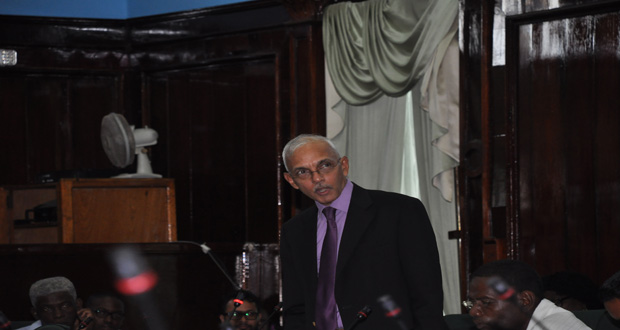PPP’s Prorogation of Parliament stunted budget allocations – Minister Bulkan tells House
MINISTER of Communities Ronald Bulkan, yesterday said significant reduction in capital spending for agriculture in Region 2 is due to the prorogation of Parliament by the former Administration last year.
Responding to the Opposition questions on the more than 50 per cent — or $80 million — “cut” in capital allocation for agriculture, He offered the explanation.
Members of the Opposition informed the House that the significant reduction clashed with the publicly stated position of the Government, that it would promote agriculture and agricultural diversification.
Minister Bulkan assured the House that the Administration is true to its promises on agriculture, but pointed out that the sum allocated in capital expenditure is for the remaining four months of this year.
Opposition Member of Parliament (MP) Cornel Damon nevertheless lamented that the money “cut” from the capital expenditure for agriculture could have been used to upgrade all-weather roads, drainage and irrigation, and other works to enhance agricultural production.
It was also noted that the access roads to rice fields are in poor state, and suggested that the Administration should have paid attention to the plight of farmers.
Another PPP/C MP Yvonne Pearson, pointed out that Amerindian communities have not all been catered for in the capital allocation. Bulkan was at pains to explain that full preparation of the budget did not begin in January, but after May; and the amount allocated is to be spent for the remainder of the year.
He also contended that the PPP/C should be blamed for the plight of the rice farmers, since they prorogued the Parliament in a move that affected the approval of sums for critical works.
Several roads will also be rehabilitated, and Bulkan said once the Regional Democratic Council (RDC) makes representation, attention will be given to the Lima Sands Bridge which is in a state of disrepair.
But he said any provision for the repairs to that bridge will be included in the 2016 budget.
Boat for schoolchildren
The minister also informed the House that a schoolboat will be purchased to be used to ferry children to school in the Lower Pomeroon region, and the Administration will construct a primary school at Aurora, and build sanitary blocks at several primary and secondary schools in Region 2.
In Region 3, under current expenditure, $1 million will be spent on spares and services to vehicles. The fleet of vehicles has been increased from three to four.
Some $24 million has also been allocated for repairs and maintenance of sanitary blocs, fences and gates of 20 schools in the region.
Under capital expenditure, the Opposition drew to the attention of the House a reduction in fuel and lubricants for the region compared to the sum allocated in 2014, and asked the Government whether the slashing was politically influenced.
Minister Bulkan said that was not the case, as fuel was purchased and stored in 2014, and stocks were available in reasonable qualities for use in 2015.
On this matter, former Housing Minister Irfaan Ali put the question to Minister Bulkan that it was wrong for some to say that the former Administration had abused a fuel facility when it was in power.
But Bulkan said the question does not follow a logical deduction.
The Opposition also pointed out that with some 125 per cent reduction in capital spending for agriculture, drainage and irrigation and agricultural output would be negatively affected.
Opposition MPs were also uneasy about the non-allocation of sums for land and water transportation; the trimming of allocation for roads from $47 million in 2014, to $23 million this year; as well as the reduction of money for land development. The Opposition also strongly insinuated that there was a reduction in the sums allocated to the regions that support the PPP/C.
But Bulkan said that was not the case;and on that score, he again repeated that the reduction had to do with late preparation of the budget and the fact that no government can meet all the demands of the people.
By Tajeram Mohabir

